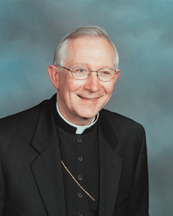Statement on Marriage from Toledo's Bishop Blair
The following is a statement published on April 2, 2013 by Bishop Leonard P. Blair of Toledo, OH, with hyperlinks added.

Bishop Leonard Blair
On March 26, 2013, a “March for Marriage” was held in Washington. D.C., as the Supreme Court heard oral arguments on California’s Proposition 8, the first of two marriage cases before it. On March 27 the Court heard oral arguments on the federal Defense of Marriage Act (DOMA).
The Roman Catholic Church condemns violence and hatred against anyone, including homosexuals. It teaches that persons with a homosexual inclination “must be accepted with respect, compassion, and sensitivity.” (Catechism of the Catholic Church, no. 2358) Good pastoral practice encourages families to accept their children, no matter what their sexual orientation, and not break relationships with them. The church believes that it is possible, by the grace of God, to live chastely, no matter what a person’s sexual inclination may be, and it looks for ways to offer hope and support for this to happen.
At the same time, however, for reasons that go far beyond the issue of homosexuality, the church continues to be at the forefront in upholding marriage as a union of one man and one woman that is marked by permanence, exclusivity, procreation and family.
The U.S. bishops put it this way: “By attempting to redefine marriage to include or be made analogous with homosexual partnerships, society is stating that the permanent union of husband and wife, the unique pattern of spousal and familial love, and the generation of new life are now only of relative importance rather than being fundamental to the existence and well-being of society as a whole.” Such an attempted redefinition reduces marriage to “a private matter, an individualistic project not related to the common good but oriented mostly to achieving personal satisfaction.” (Marriage: Love & Life in the Divine Plan, 2009, pp 3,21ff)
Law is a teacher that is meant to inform and uphold the common good. Calling homosexual relationships “marriage” means that a romantic co-habitating partnership is sufficient. The inevitable effect is to further weaken people’s understanding and commitment to marriage, not only as permanent and exclusive, but also as procreative in a way that only opposite sexes can be.
Cardinal George of Chicago summarizes the situation as follows: “[N]o matter how strong a friendship or deep a love between persons of the same sex might be, it is physically impossible for two men, or two women, to consummate a marital union. Even in civil law, non-consummation of a marriage is reason for annulment. Sexual relations between a man and a woman are naturally and necessarily different from sexual relations between same-sex partners. This truth is part of the common sense of the human race…. A proposal to change this truth about marriage in civil law is … an affront to human reason and the common good of society. It means we are all to pretend to accept something we know is physically impossible.” (Catholic New World, Jan 6-19, 2013)
Redefining a fundamental institution of life and society simply on the basis of feelings and sympathy for others should give us pause. The state and its laws do not create marriage, but only regulate and promote it for the sake of the human flourishing that marriage provides, as the social sciences have shown time and again. If the state can create a fiction of marriage, then what other realities and relationships will it claim the right to redefine, regulate or create, just as it is already doing with human life itself? And if society, on the basis of demonstrated values, is no longer able to refuse any claimed “right,” then what behaviors can we expect to be sanctioned in the future? What prevents these behaviors not only from being accepted, but also promoted and enforced, as equal to other behaviors? And what about the freedom — religious or otherwise — of those who cannot and will not accede to society’s “brave new world?”
As our former pope, Benedict, has cautioned: “When the freedom to be creative becomes the freedom to create oneself, then necessarily the Maker himself is denied and ultimately man too is stripped of his dignity as a creature of God, as the image of God at the core of his being. The defense of the family is about man himself.” (Dec. 21, 2012)
For more information on Catholic teaching on marriage, questions and answers on this topic, and additional resources, please visit http://www.marriageuniqueforareason.org/.
****